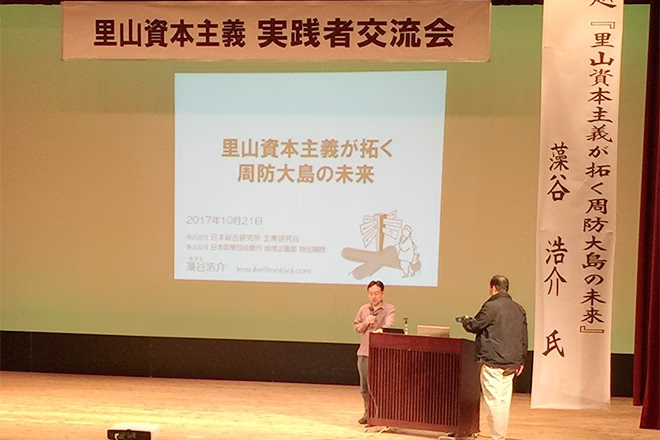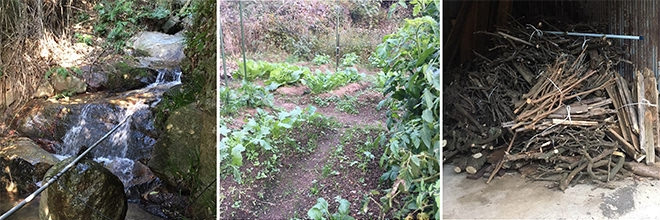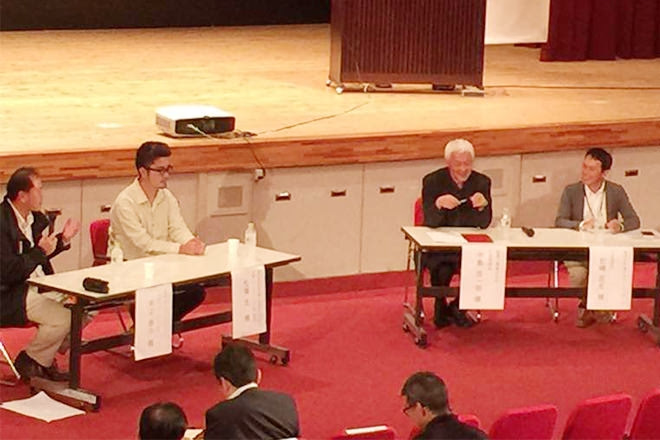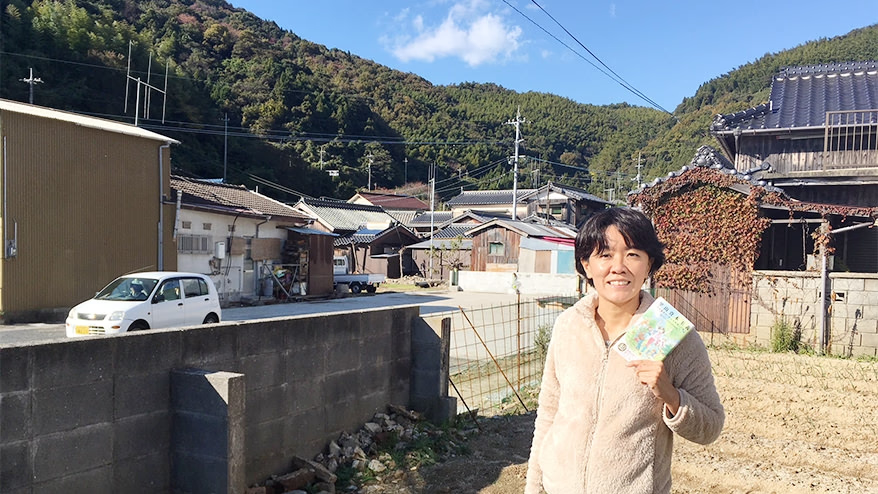My name is Nagai, and I am the Vice President working at the Suo-Oshima Satellite Office (temporary office currently in preparation).
I've gotten used to life here, and when I occasionally go to Tokyo, I find myself getting very nervous and careful when walking around Shinjuku Station in the morning, just trying not to bump into people. I'm immersed in a strange feeling, thinking that the things I've been able to do without thinking before are actually "skills unique to the city."
Recently, I attended the Satoyama Capitalism Practitioners' Gathering held in Suo-Oshima. Satoyama Capitalism is a concept that spread from the bookSatoyama Capitalism: The Japanese Economy Runs on the Principle of Security , which was released in 2013 and became a huge hit, selling 400,000 copies. It has attracted attention as a way of thinking that promotes change in traditional "money capitalism." As a beginner, I was intrigued to attend the gathering, which brought together the author, Motani Kosuke, and the practitioners featured in the book.
In this article, I would like to share with you the concept of "Satoyama Capitalism" that I heard about there, as well as my own feelings and thoughts after living on Suo-Oshima, a place that has been described as "the embodiment of Satoyama Capitalism."
When you leave the workforce, you still have one-third of your life left
I am now 46 years old. It's been almost 25 years since I graduated from university and joined the workforce (I was surprised when I wrote this!). If I were to retire early, I would be able to say that I have done a good job as a corporate employee if I worked for 15 years, or at most 20 years.
When I think about it this way, I feel like it might be a little late to start learning something new or trying something new, but if I think about it from the perspective of Satoyama capitalism...
Motani advocates thinking about staying "active" into your 80s.
Indeed, in Suo-Oshima, grandmothers grow all the vegetables they can to send to their children and grandchildren, and grandfathers work hard weeding vacant lots and fishing for their families. The majority of people there are in their 70s and 80s! Farm work and fishing are not jobs that earn money, but they are needed by those around them, and they work to please those around them, so you could say they are "active workers" every day.

The keynote speech was given by Mr. Motani, author of "Satoyama Capitalism," entitled "The Future of Suo-Oshima Opened by Satoyama Capitalism." It was a humorous speech interspersed with surprising data. Incidentally, the man taking pictures next to him was Mr. Inoue, who also wrote the book.
In the world of Internet technology, where I have been working, the industry itself is so young that there is even a saying that the retirement age is 35. I think there are very few ways of working that would allow you to remain active and be a model for cool people even as you get older, into your 50s, 60s, etc.
However, the average life expectancy of women is now approaching 87 years. I'm 46 years old and I have 41 years left! I have far more than the 25 years I have since I joined the workforce. Even if I were to retire at 60, I would still have 27 years left, meaning that even after I leave the workforce, I would still have 1/3 of my life left.
So, how will we spend the next 40 years?
If possible, I would like to remain an active worker until the day I die, doing a job that I choose and that I find enjoyable. I feel that the example of my senior colleagues who continue to "work" on Suo-Oshima holds many hints for me.
The certainty of life that can be achieved through 1% self-sufficiency
Motani recommends "becoming self-sufficient in the water, food, and fuel you need within the range of 1 to 99 percent."
Of course, in modern life, we need to buy food and pay rent. We also need money for gas, to go out to eat and have fun every once in a while, and we need clothes and transportation to get to Tokyo. It is important to earn money in a capitalist society by selling your labor, abilities, know-how, etc. (for as high a price as possible), and it can even be said that it is essential to be able to earn money.
However, even in such circumstances, having the means to obtain some of your basic needs (water, food, fuel) in ways other than buying them with money can act as a safety guard.
I have a funny story about this now.
When we were considering whether to set up a satellite office in Kamiyama Town, Tokushima Prefecture, before moving to Suo-Oshima, our CEO, Hayashi, mentioned the benefits of expanding into Kamiyama and said the following.
"Even if something were to happen in Tokyo, I want to be able to provide enough rice for all my staff to eat."
To be honest, at the time I thought, "What is this guy thinking?" I heard that even during the earthquake, when the situation was still dire, no one died of starvation. At a time like this, instead of increasing profits, he was trying to hedge his risks by growing rice? Is he okay? The CEO...
Even now, I don't believe that growing rice itself is a risk hedge for the survival and development of the company, but since coming to Suo-Oshima, I feel like I understand a little better what Hayashi was trying to say back then.

A view of the Jikamuro district of Suo-Oshima. Self-sufficiency in some of the water, food, and fuel that Motani advocated is commonplace here.
[Left] Water: A clear stream that flows through our Chikamuro district. The hose in the foreground seems to be drawing water to the fields.
[Center] Food: It's the peak season for winter vegetables in our field. Will we be able to harvest a year's worth of radishes, turnips, spinach, Chinese cabbage, potatoes, etc.?
[Right] Fuel: Firewood from the old lady next door (estimated to be around 80 years old) who lives alone. Maybe this is enough to get us through the winter?
In Suo-Oshima, even though I'm a farming beginner, I can plant seeds and harvest so many tomatoes and cucumbers that I can't eat them all, and when my husband goes out to sea, he can catch dozens of fish in about two hours. Also, in the Chikamuro area where I live, people still use wood-burning baths and wood-burning stoves for cooking (many of which are homemade from drums!).
Of course, no one lives relying 100% on firewood for all their fuel needs, but there are many people who use both in a good way, such as using both firewood and an electric water heater for the bath, or using gas for breakfast and dinner but cooking large amounts of bamboo shoots in a large pot by simply lighting the wood stove and leaving it for a while, and then it's ready.
As for water, now that the water supply system has been developed, people no longer have to go all the way up the mountain to get drinking water, but they do use river water to sprinkle on their fields and to rinse dirty clothes. In the past, the mountain water was also provided to other villages, but I have never seen it dry up, even in the summer.
The lifestyles that many people in Suo-Oshima lead are not something that should be asked of the world in lofty terms, such as risk hedging in the event of a disaster, or casting a stone over materialism. The natural activities that they undertake as part of the means of survival for themselves and their families have resulted in them (perhaps without realizing it themselves) preparing for the worst case scenario in which money would be of no use.
The peace of mind that even if something were to happen, you'd be able to get by without any problems for a week or ten days.
This is something that we truly enjoy naturally.
When I think about it, it's becoming common for me to go a week without spending a single yen, probably because the places I go shopping are far away.
Being able to grow and pick vegetables and fish within sight of you.
Being able to start a fire using firewood that you cut yourself in the mountains to keep warm and cook.
As I slowly begin to live this way, I realize that it's not a life I can survive on without money, but rather a sense of self-confidence and reality that is difficult to achieve when living only on things bought with money.
Being in the countryside enhances each individual's presence

Panel discussion of practitioners of Satoyama capitalism. On the far right is Masashi Matsushima of Setouchi Jams Garden Co., Ltd., a success story of the sixth industry in Suo-Oshima that was also introduced in the book. It is a very delicious jam shop with a lovely relaxing cafe.
The thing that made the biggest impression on me about this exchange meeting was that in Satoyama, each individual plays an important role, without whom the organization would not function.
Indeed, here in Jikamuro, Suo-Oshima-cho, even an old lady who can barely walk comes to prepare for the festival and takes charge, saying things like, "Arrange this like this," and "Put that over there." An old man gives instructions on the tempo of the utai (songs sung to the accompaniment of drums) and how to turn on the lights around the tower. How to do a thorough cleanup of the area, when and what to plant, where to go to find what. It seems likely that if even one of these people were to disappear, the "nature of the area" would definitely change.
This is true even for me, who has only been here for less than a year.
Living in an abandoned vacant house and steadily renovating it. Mowing an overgrown vacant lot and planting crops. Whatever I do, I get asked to do it.
"What are you doing?" "What are you doing today?"
In Tokyo, a city with a population of 10 million, people might see something and immediately lose interest, but in a village with a population of 50 people, it becomes big news and everyone takes an interest and gets involved.
In a company, most of the work is done in a manual and structured so that someone else can do it. This is necessary to ensure a certain level of quality, but it is very difficult to be "irreplaceable" in that environment.
What I feel while living on Suo-Oshima is that the relationships I live in are focused on "my existence itself," rather than on the "purpose" of what I do or the "ability" of what I can do.
Today, I have introduced excerpts from the talks at the "Satoyama Capitalism Practitioners Exchange Meeting" that really resonated with me. I have excerpted too much, so it feels more like a subjective message than an introduction, but I feel like I have been able to put into words a little bit of the comfort I have felt living in the countryside for the past six months. I would like to continue to explore this something that I have come to see within myself.
